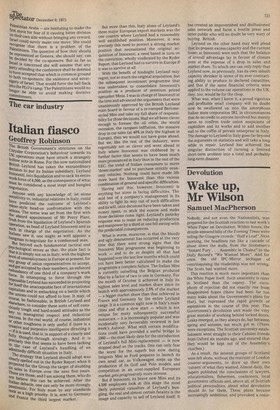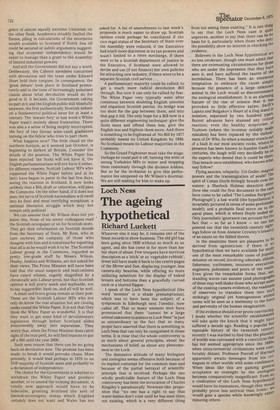Devolution
Wake up, Mr Wilson
Samuel MacPherson
Nobody, and not even the Nationalists, was prepared for the Scottish reaction to last week's White Paper on Devolution. Within hours, the drizzle-smeared bills of the Evening Times were telling the Glasgow crowds: "Haifa Loaf". Next morning, the headlines ran like a cascade of abuse down the stalls, from the Scotsman's "Instant Fury. . . Assembly in Chains" to the Daily Record's "We Wanted More". And for once, the old IPC-Mirror techique of ventriloquising the readership was not wrong. The Scots had wanted more.
This reaction is much more important than the White Paper itself. Such unanimity is rarer in Scotland than the osprey. The cacophony of rejection did not exactly rise from disappointed hopes (there had been far too many leaks about the Government's plans for that), but expressed the rapid growth of aspirations in the course of this year. The Government's devolution unit made the very great mistake of working behind locked doors. Leaks emerged, as they always do, but between spring and autumn, not much got in. (There were exceptions. The Scottish university establishment went straight to their Cabinet friends from Oxford six months ago, and ensured that they would be kept out of the Assembly's clutches.)
As a result, the interest groups of Scotland were left alone, without the restraint of London counter-arguments, to draw up their own 'cahiers' of what they wanted. Almost daily, the Papers published the conclusions of lawyers, educationalists, fishermen, coalminers, local government officials and, above all, of Scottish political personalities, about what devolution should do for them. These plans became increasingly ambitious, and provoked a resur
gence of almost equally extreme Unionism on the other flank. Academics steadily fuelled the flames, piling in calculations of the enormous wealth available to Scotland if North Sea oil could be secured or subtle arguments suggesting that economic independence would be easier to manage than a grant to the Assembly of limited industrial powers.
And still the Government did not say a word. Deliberately, the Cabinet members concerned with devolution and the team under Edward Short held their tongues. In consequence, the 'great debate' took place in Scotland prematurely and to the tune of increasingly polarised claims about what devolution would do for good or ill. It became, the Government taking no part in it and the English public still blissfully unaware, the first authentically Scottish debate on a fundamental political issue for at least a century. The 'instant fury' at last week's White Paper wasn't entirely about frustration. There was also a a sense of being ineptly interrupted, the fury of two Govan wine-vault gladiators turning on the fellow who tries to part them.
What happens now? The little cloud on the northern horizon, as it seemed last October, is beginning to darken all Britain. Consider the details of the position. The White Paper has been rejected: the Scots will not have it, the English parliamentarians will not have it either, for different reasons. Scottish Labour MPs who supported the White Paper before and at its birth have begun to panic in the last few days, seeing the reaction in Scotland. It now looks unlikely that a Bill, draft or otherwise, will pass the Commons. On the other hand, if it does not pass, the larva of Scottish nationalism will swell into its final and most terrifying morphism: a national liberation struggle which may not remain only political.
We can assume that Mr Wilson does not yet know this. None of his senior colleagues read the Scottish newspaper or sit for Scottish seats. They get their information on Scottish moods from the Secretary of State, Mr Ross, who in turn eschews the company of those who disagree with him and is notorious for reporting that all is as he would wish it to be. The Scottish Labour group in the Commons, regarded as pretty low-grade stuff by Messrs Wilson, Healey, Jenkins and Williams, are not asked for their views. The Prime Minister will have been told that the usual suspects and malcontents have raised whines, eagerly magnified by a chronically anti-Labour press, but that Scottish opinion is still pretty meek and malleable, not to say suggestible: bash on, and all will be well.
A small and brave group remain at their post. These are the Scottish Labour MPs who not only do know the real situation but are closing ranks round the White Paper. It is not that they think the White Paper so wonderful. It is that they want to get some kind of devolutionary legislation through before Scotland slides irrecoverably away into separatism. They worry that, when the Prime Minister does catch sight of the true peril, he will find reasons to put off a Bill until the year 2000.
Such men reason that there can be no going back on devolution now. The promise has been made: to break it would provoke chaos. More precisely, it would lead perhaps in 1978 to an SNP majority of Scottish seats and probably to a declaration of independence.
The choice for the Government is whether to withdraw the White Paper and produce another, or to amend the existing document. A totally new approach would have to be federalist, granting Scotland the sort of limited-sovereignty status which England certainly does not want and Wales has not asked for. A list of amendments to last week's proposals is much easier to draw up. Scottish opinion could perhaps be conciliated if the vice-regal status of the Secretary of State over the Assembly were reduced, if the Executive' had much more discretion in its tax powers and wasn't limited to a rates surcharge, if there were to be a Scottish department of justice in the Executive, if Scotland were allowed to devise and use (if not finance) her own policies for attracting new industry, if there were to be a separate Scottish civil service ...
A parliamentary majority could be rallied, to get a much more radical devolution Bill through. But now it can only be rallied by fear. The White Paper very typically went after consensus between doubting English unionist and impatient Scottish patriot. Its bridge was too short for the gap between them, and into that gap it fell. The only hope for a Bill now is a quite different engineering technique: give the Scots more and offend them less, give the English less and frighten them more. And there is something to be frightened of. No Bill by 1977 probably means no United Kingdom by 1980. No Scotland means no Labour majorities in the Commons.
So the Grand Frightener must take the stage. Perhaps he could pull it off, turning the wills of strong Yorkshire MPs to water and mopping them resistlessly through the division lobbies. But so far the invitation to give this performance lies unopened on Mr Wilson's doormat. We are still waiting for him to wake up.


































 Previous page
Previous page